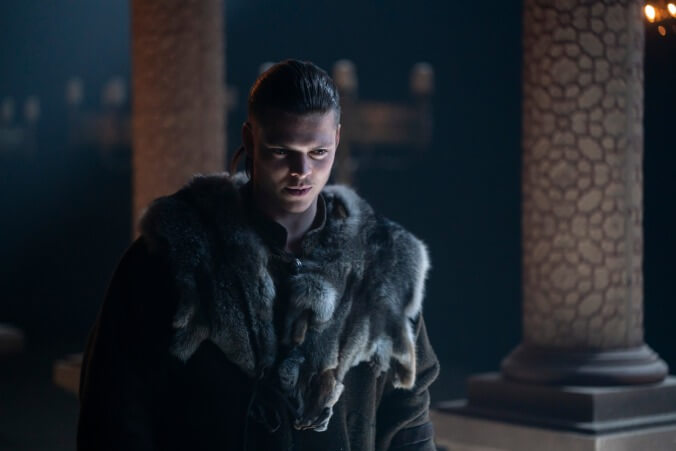“The Key” concludes with a lavish ceremony where King Olaf’s plan for a free and fair election of the one true king of all Norway commences on a circular floating platform, each participating regional king, jarl, and other gathered ruler sitting somberly upon a throne under a color-coded banner. Explaining both his dream for a “king of kings” to unify his nation, and the rules for the voting system he’s devised, the ever-booming Olaf addresses the assembled kings and commoners gathered in boats and on shore. And explains. And explains. Different colored floating tokens are to be plunked in a central well on the platform. The resulting vote will (in Olaf’s mind, at least) make Bjorn Ironside the unquestioned ruler, uniting the fractious Norwegian territories and peoples in defense against foreign enemies, all in the service of the greater good. After some unsubtly shifty head-nodding and elliptical remarks with the glowering Kjetill, King Harald eschews his own pile of tokens (coded yellow, which seems like the sort of slight the striving Harald would store up for later) to select Bjorn’s red one, and plop it into the water, seemingly heralding Bjorn’s ascension.
It’s interesting enough stuff, as Olaf’s plan remains yoked to some sort of late-life messianic mission to ward off the inevitable end of the old ways, even if Harald and Kjetill’s obvious plotting suggests some of the old, runty Harald Finehair scheming. (Again, we’ve gotta get the still-absent Floki in on this storyline, and soon.) But the buildup and payoff here put me in mind of another long-ago gathering, the contrast in storytelling instincts deadening this newest chapter in what Olaf portentously pronounces “the saga of our country” in contrast. Just a little detail—the ceremonial splashing of the participants faces with blood—sparks the comparison to the sacrificial gathering at Uppsala way back in season one’s “Sacrifice,” as Bjorn, Harald, and all the other leaders submit to a brush of bloody spray, just as Ragnar, Athelstan, and Lagertha had. Back then, Vikings’ instincts were to allow us to encounter the rituals and actions of this alien-to-us culture with an energizing lack of hand-holding. We knew the bare bones of what we were seeing (the Norse travel every nine years to the holy site to honor the gods with sacrifice), while obscuring both the real drama lurking in the journey (Ragnar’s plan to offer up captive monk and friend Athelstan as sacrifice), and, most thrillingly, Ragnar’s true motivations for what he ultimately chooses not to do. At the end, Athelstan lives, and he’s as bewildered why as are we. Initially, Vikings’ understanding of the real storytelling potential of its long-ago milieu lay in its ambiguity.
Here, with Olaf explaining the rules like he’s setting up a board game (tokens and all), the stakes and the steps are all laid out in appropriately game board fashion. Sure, Harald is planning something for next time, but, as the assembled musicians’ rhythms literally try to drum up suspense, Vikings has forgotten that the chief draw of Vikings has always been that we don’t know this world’s rules. Not really. Michael Hirst is still and ever running the game, but, six seasons in, he’s all but abandoned what made it special in the first place.
Instead, we get intrigue and twists, and lots of both. Ivar frees the maimed and imprisoned Dir from his cage with the help of Igor (and the old “naked lady to distract the guards” gambit), only to be gobsmacked that the angry Oleg’s new bride is a dead ringer for his late (as in murdered by Ivar) queen, Freydis. (Danila Kozlovsky’s suspicious Oleg continues to whip out the dastardly supervillain surprises, here offering Ivar and Igor a meal concealed by some suspiciously skull-sized serving domes containing the severed, tortured heads of the duped guards.) This whole Rus storyline has its charms—Oleg’s a one-dimensionally charismatic baddie, and the change in color palette from Norway’s earth tones to the ruby and gold of the Rus offers up a compelling visual contrast. But, as Ivar confronts the enigmatically cagy lookalike Princess Katia in baffled wonder, the whole mystery smacks very hard of effortful twistiness for its own sake. No offense to Alicia Agneson (who, indeed, played the doomed Freydis), but if someone who’s reviewed every episode of Vikings from the beginning had to scramble to recall just why the hell her sudden appearance made Ivar so squirrelly, the more casual viewer can be excused for asking what the big deal was.
Ivar’s intrigues (he is planning to use Oleg’s help and some newly revealed fake documents to lay claim to Kattegat once again) are already convoluted enough, thanks, and this development does nothing but promise the return of a relationship that never lived up to its promise in the first place. Better remains the Ivar-Igor relationship, as Ivar’s obvious manipulation of the captive child-ruler (seen playacting as Ivar’s puppet, for added subtlety here), sees their prankish bond prickling with some of the hidden and complex motivations in such short supply elsewhere.
Ivar’s ghost haunts everyone back in Kattegat, figuratively (as Ubbe susses out Ivar’s conqueror’s plotting from the reports of his Silk Road envoys), and literally, as the shuddering wreck that is Hvitserk continues to see monstrous specters of his little brother everywhere. And while Ubbe’s quick-on-the-uptake recognition of the looming threat posed by Ivar is a mark in his favor as Kattegat’s acting ruler, it’s in poor Hvitserk’s ongoing madness that the true menace of Ivar the Boneless shows its most potent legacy. Far more interesting than supervillain team-ups with Russian princes or inexplicable dead wife reveals, Ivar’s story (mirrored in Hvitserk) carries the seeds of Ragnar’s story far more promisingly.
In the gimlet-eyed and scrabbling Ivar, we’re given a twisted realization of Ragnar Lothbrok’s ambition, while the perpetually overlooked and now shattered Hvitserk offers another. Colliding last season in Hvitserk’s wavering alliance with his younger brother, their relationship revealed how the warring remnants of their father’s splintered legacy are seemingly destined to destroy each other. Ivar’s questionable humanity might be hanging by the slenderest thread at this point, but Hvitserk—wracked with guilt and losing himself in drink and his dad’s old occasional hallucinogenic mushroom habit—has become an improbably affecting portrait of just what happens to the also-ran heir to a legend. There’s a telling juxtaposition between Hvitserk enlisting men to drag one of Ivar’s impervious iron gates to fortify his hovel and the stick-thatch walls Lagertha and Gunnhild fashion to shore up Lagertha’s village against the bandits’ inevitable return. While Lagertha passes the episode still awaiting her nemeses’ attack on her practical defenses, it’s Hvitserk’s over-elaborate door’s protection that’s ultimately assailed—and breached—by the inescapable monsters he’s created in his fevered brain.
Marco Ilsø, freed finally to show some personality (however debased) in Hvitserk’s descent into disgrace and madness, continues to make Hvitserk’s tortured and multifaceted guilt his own, and something independent ultimately of the unprofitable track his character’s been on from the start. In the effectively showy hallucinations of dead lover Thora and Ivar (here conjured rather niftily as a ship-toppling serpent and a sneering nightmare creature straight out of Norse mythology), Ilsø yet makes Hvitserk’s pain real—even if Hirst brings back one of the series’ most tiresome characters/plot devices to apparently set him back toward sanity.
John Kavanagh’s Seer is another of Ivar’s very dead victims who refuses to disappear, here popping up again at the destitute Hvitserk’s lowest point (having just sacrificed his arm ring for ale and mushrooms) to sonorously intone some more of his cryptic yet invariably accurate predictions about Hvitserk’s fate. As with Gunnhild’s all too spot-on dream about the attack on Lagertha’s settlement last episode, Vikings’ reliance on the unambiguously supernatural to advance its narrative is the show’s most enervating miscalculation. (I get that the Seer here is supposed to be Hvitserk’s tripping brain calling up an old figure to give shape to his raging thoughts, but if the Seer’s prediction that Hvitserk’s journey will take him to “places beyond the world’s end” and that “either you had no purpose or your purpose is beyond the end you figured, altered in fulfillment” don’t turn out to be on the money, I’ll eat my hat.)
“The Key” is Vikings marching on stubbornly despite—like its Norway—having no real leadership after the loss of Ragnar Lothbrok. No character has risen to challenge his position in our estimation, just as Bjorn Ironside’s supposed rise to King of Norway promises to be, as one kingly supporter expresses to Bjorn tellingly, that of “a figurehead.” And that’s not necessarily a bad thing. Vikings after Ragnar is very much about how a great man’s vision must be nurtured—and transformed—after his death. And how a society’s perceived need for one charismatic figure to lead it is, itself, a dangerous fallacy to be deconstructed. The problem is that Vikings itself is losing its way as much as are the Vikings.
Stray observations
- I mean, Freydis was dead, right? Not mostly dead, or Mission Impossible latex mask double dead, but “strangled to death graphically by Ivar” dead. So what are we doing here? Long-lost twin? Impossible coincidence? Some sort of Marvel villain life model decoy plot from Oleg? Genuinely trying to conjure which option would be more infuriating.
- Another of Hirst’s methods of building up the tension before the big vote is this exchange. Kjetill: “Bjorn . . .” Bjorn: “What?” Kjetill: “Nothing.”
- On the “Bjorn desultorily sleeping with everyone in sight” front, Bjorn makes eyes at a new female jarl in town for the vote. Meanwhile, servant girl Ingrid is confronted pining for Bjorn’s return by Bjorn’s former wife Torvi, who knows what’s up. “Each time he came back, he was further away,” Torvi advises.
- Present and former queens bond as Gunnhild and Lagertha fortify the settlement. Taken aback at Lagertha’s reluctance to take up her sword again, Lagertha tells her shieldmaiden daughter-in-law, of her old self, “I had to dig her up again, but she is not the same.”
- There’s another fine moment when Lagertha’s retired shieldmaidens and Gunnhiuld’s rowdy young female warriors all bond over drinks and a campfire as they prepare for what’s to come.
- Happy 2020. As ever, it’s the Vikings first into the breach for what threatens to be another ugly, challenging year. Shield wall, people.



 Keep scrolling for more great stories from A.V. Club.
Keep scrolling for more great stories from A.V. Club.